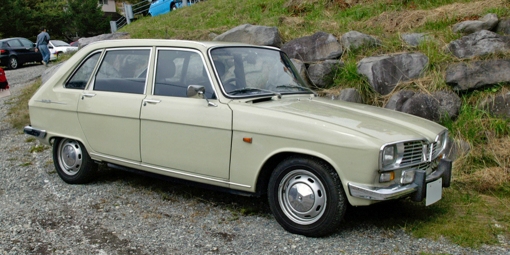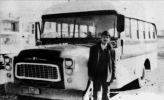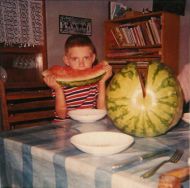Getting around
When ever my mother went to the market she used her red bicycle and I would be seated on the rear rack. It was a harsh ride in to the market but a smooth one back as I then was seated on top of the clothes and fabric she bought. Groceries were hanging in bags from the handlebar, but I suppose our servant helped out too.
These small expeditions were not without risk. Not that there was a Taliban govern but the religious fanatics where still present and the stories of women getting acid thrown in there faces did exist. I believe my mother used to wear a scarf when in unfamiliar public spaces.
For public transport there were busses, packed with travellers not only on the inside but on the outside as well. When boarding the luggage was thrown up to a catcher on the roof, stored and lashed to a rack. God knows how they managed to sort it out later when somebody had to get off. Like much in Afghanistan it was managed with a sort of chaotic organisation that I believe you actually must be native to understand. The busses where colourful art pieces with paintings and attached ornamented boards in all kind of spaces available. The delight in the creations diminished once you realized the purpose, as invocation to all kind of Gods to survive the roads. In the end, not really an alternative for a westerner with kids and a minute understanding of Farsi[1].
Taxi would be a better choice but you could not take just anyone, you would have to inspect it to be somewhat safe to ride in because the standard could, to say the least, vary. Anyone with a pair of rolling wheels could make a living for himself, it seemed. I remember seeing a taxi with only a funnel for gas tank with the driver popping out to fill up the funnel from a can each and every mile. Cars missing hoods or fenders were not unusual and leaking radiators were somewhat of a consistent standard.
On top of that, Kabul was scarce with street names so you would have to know your way around, giving directions to the driver in Farsi, daste raast, daste chab, robaroo, as in turn left, turn right, strait ahead.
I don’t think that we owned a car in Kabul but I remember a beige tin box on wheels parked in the street outside our house one time, and that we were to ride in it somewhere. We did trips out in the country sometimes and we must have done it by car but I do not remember the details. We did one trip over the Khyber Pass to Peshawar, in Pakistan. I remember overlooking a railyard from a bridge watching huge black steam locomotives maneuver the train sets in clouds of steam and black coal smoke. In Sweden all trains where electrified or operated by diesel engines so this image has burnt in to my retina and I’ve never seen something close to it in real life since.
Afghanistan did not have a railway. They relied on roads, many built by Soviet aid, camel caravans and airplanes to connect the different parts of the country. My mother used to tell me a story about a tourist trip she did with some of the other housewives to Herat. That’s in the other end of the country so they had to travel in a small airplane. On the route the pilot had other stops and at one time he went down to deliver some eggs to a crowd of people, in what looked like a desert. The party of women, in desperate need to pee, stepped of, but at this place there was no toilet, no buildings, no nothing. Not even a tiny bush to hide behind, so in the vast plain they formed a ring as a screen and then stepped inside one after another to ease the pressure. Where all the people of the place came from remained a mystery, as they took to the skies again.
On school days I was picked up by a yellow and black American style school bus. I have one memory of riding it. Along with other school kids there was an Indian girl, a couple of years older than me, who had an egg saved from her lunchbox that she ate during the ride home, but she didn’t like the yellow. I found that curious and we probably had a discussion about it. Anyway she gave me the yellow after eating all the white. This is a strange memory entirely. I wonder why that got stuck in my brain.
Posted in Memories and tagged bus, desert, Farsi, Kabul, Khyber Pass, market, railway, school, taxi by nils with 2 comments.
Memories of food and sickness
I have a memory fragment of a dinner. I don’t know where or why but there are both Afghans and foreigners around the big table. In the middle is served big plates of rice cooked in saffron mixed with shredded carrots and raisins. And there was hot pepper soup, the kind so spicy hot your eyes water, and me amusing the group by enjoying a full bowl of it.
I remember going to the baker to buy Nan bread. Seeing the oven in the form of a small hut, how the baker flattened the dough on a floured cushion and then another baker, with his turban wrapped around his head and face against the heat, mounted the dough to the ceiling of the hot oven and pulling out the already baked bread. Thinking back I’m impressed by the heat tolerance of that guy, having half his body inside a hot oven in and out all day.
I also remember eating huge water melons. Well, those memories might actually have been boosted with images from our photo album. I can’t really be sure on them, but it feels like I have recollections of melon slices that needed both hands to handle.
As we were rich foreigners we had servants. Only one at the time but I think we went through three servants during our stay. Not that we really needed them but we were expected to have servants. It was seen as greedy not to employ a servant if you had the money to do so.
I called all the servants “Kalle” and as they succeeded one another, they were numbered so our second employed servant became “Kalle du” as for two in Farsi[1]. I believe he stayed the longest with us. I have a fragmented memory of our family visiting his family outside his small house built of mud and straw as most Afghan houses.
“Kalle du” helped out by translating to my mom in the market and finding good groceries. Even in Afghanistan there were frauds. One trick was to inject water into fruit like oranges to make them seem extra juicy, but the water was taken from the river, commonly used both to wash laundry and as a toilet, so there was a serious health risk to eat those. He also helped out watering in the garden and sewing curtains from beautiful fabrics my mom bought on the market.
Inspired by the trips to the market I used to play street vendor, walking around with a pillow on my head shouting in Farsi, or at least something that sounded like Farsi, to sell my imaginary goods, to everyone’s entertainment. In particular “Kalle du” that used to laugh when I did my routine. I liked him and I believe he liked me, thinking I was a funny kid.
One day he bought me a lollipop from a candy vendor passing on the street. It was shaped as a big colourful rooster. I ran exited in to my mother to show this wonderful gift when she terrified grabbed it from me and poured boiling water over it until it collapsed into a malformed lump.
I can understand my mother. Hygiene wasn’t a priority here and after spending the first weeks in the country vomiting to the limit my parents feared for my life, they actually planned to give up and return home when I suddenly recovered, she was not prepared to take any more risks.
Memory flash: A trail of vomit puddles on the floor while I’m hanging out from the arms of my father carrying me.
But I clearly remember the emotional rollercoaster from happy excitement to deepest despair as I saw the lollipop melt.
Posted in Memories and tagged Farsi, hot pepper soup, lollipop, market, Melon, Nan, saffron, servant, water by nils with no comments yet.


